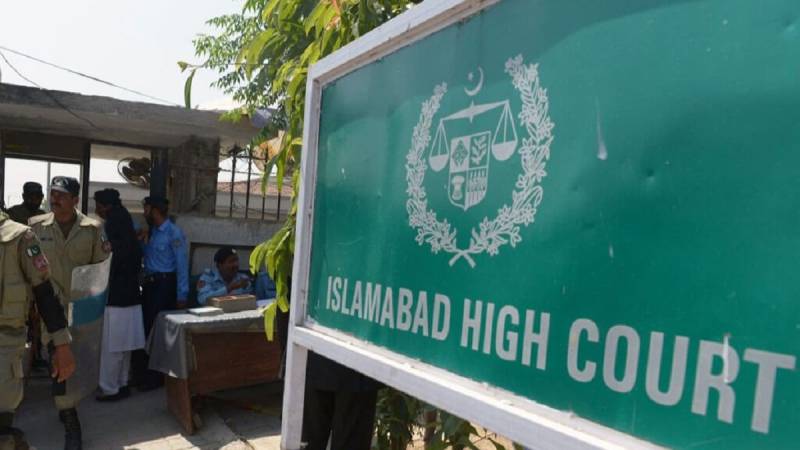
In a landmark verdict, the Islamabad High Court (IHC) Friday sentenced Islamabad's Deputy Commissioner (DC) Irfan Nawaz Memon, Superintendent of Police (SSP) Operations Jameel Zafar and Station House Officer (SHO) Naseer Manzoor for contempt of court after the former issued scores of detention orders against PTI leaders and workers, while the latter implemented them, in violation of court orders. The court subsequently sentenced Islamabad DC to six months in prison, the SSP to four months in prison, and the SHO to two months, along with slapping all three with a fine of Rs100,000 each.
"The respondents have a right to appeal this verdict before a divisional bench of this court within 30 days pursuant to section 19 of the Ordinance," the court ruled.
As the sentences awarded are short and the convicted respondents are public servants who do not pose a flight risk, the court said their sentences should stay suspended for 30 days to enable the respondents to lodge appeals against their sentences.
The district administration and police officers sentenced were facing contempt of court proceedings for abusing and disregarding orders of the high court, which had been declared as illegal detention orders passed under the Maintenance of Public Order Ordinance 1960.
Between May and November 2023, DC Irfan Memon issued some 69 detention orders against leaders and workers of the Pakistan Tehreek-e-Insaf (PTI). Over two dozen petitions challenging these orders were filed before the IHC. Barrister Taimur Malik, who contested elections from NA-148, was one of the counsels for the detained PTI leaders.
In the landmark 73-page verdict, IHC's Justice Babar Sattar has directed the prime minister to investigate whether deputy commissioners across Pakistan, who continued to issue detention orders under the Maintenance of Public Ordinance (MPO), in breach of the law, the Constitution and judicial orders and if they were acting in an organised manner based on illegal orders.
"And if so, take appropriate remedial action to ensure that the authority of the state to be exercised through chosen representatives of people, continues to be exercised according to the Constitution and the law," the prime minister was directed by the high court. Justice Sattar further ordered his office to send the premier a copy of the judgment.
The verdict observed that it cannot be allowed that public officials wield the law as a weapon to oppress their fellow citizens and deny them their fundamental rights as guaranteed by the Constitution.
"It can also not be conceived that public officials, serving as part of the executive branch of the state, would wield their powers to undermine and frustrate decisions rendered by the judicial branch of the state."
According to the verdict, the high court viewed the synchronised issuance of detention orders by the Islamabad Deputy Commissioner and those in other parts of the country to be part of a deliberate policy measure executed by public officials in control of the executive branch of the state from May 2023 onward, with the object of establishing for the consumption of all and sundry that only state organ capable of allowing citizens access to their fundamental rights was the executive itself.
"Such policy and actions taken in its pursuit threaten the concept of separation of powers, which is a salient feature of the Constitution."
"They also threaten the existence of the judiciary as an independent pillar of the state conferred with the responsibility of adjudicating grievances between the citizens and the state," the judgement observed.
"If such policy of deliberate and calculated disregard for fundamental rights of citizens, and rendering dysfunctional the machinery for enforcement of fundamental rights in the form of an independent judiciary, is allowed to persevere, there can be no rule of law in Pakistan."
Justice Babar Sattar further observed that the armed forces are a subset of the executive, as a subordinate of the elected civilian government, who act in aid of civil power under Article 245 of the Constitution when asked to do so by the federal government.
"The emphasis of the learned counsel for Respondent No. 1 on the inclusion of military officers within the DIC (District Intelligence Committee) that supported the issuance of detention order dated August 8, 2023, as if that is some magic wand that will miraculously get the respondents off the hook, is misconceived to put it politely," the verdict read.
"Neither the DIC nor any members of the DIC, whether serving in the armed forces or in intelligence agencies, had any authority over respondents No.1, 2 and 4," the court said, adding that neither the reports issued by the Special Branch or by the Intelligence Bureau nor the opinion of DIC was binding on the Islamabad deputy commissioner.
"In their capacity as the Deputy Commissioner and SSP Operations, respondents No.1 and 2, respectively, were neither assets nor stooges of security agencies. They cannot hide behind members of intelligence or security agencies when found liable for dereliction of the duty, illegal conduct and obstruction of justice."

